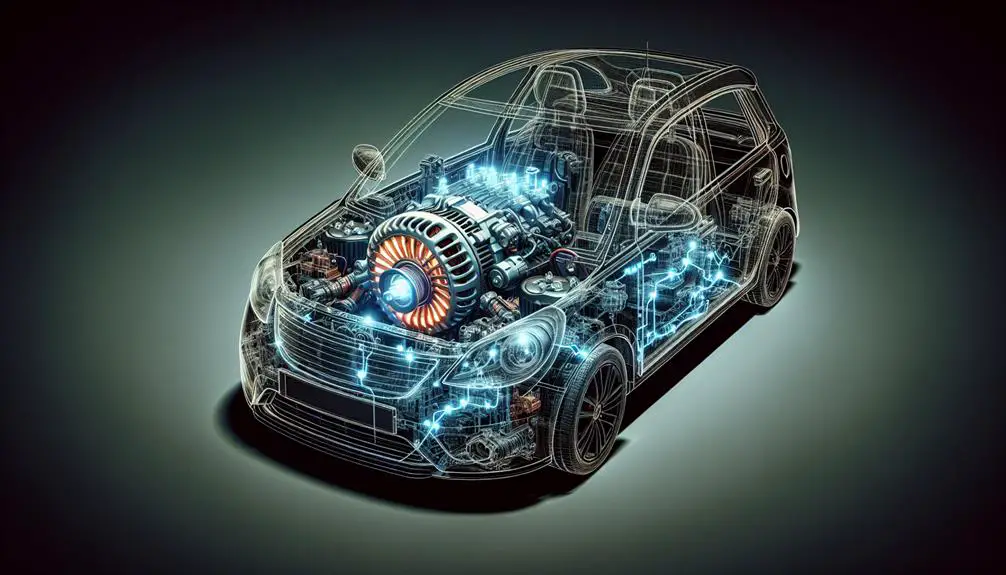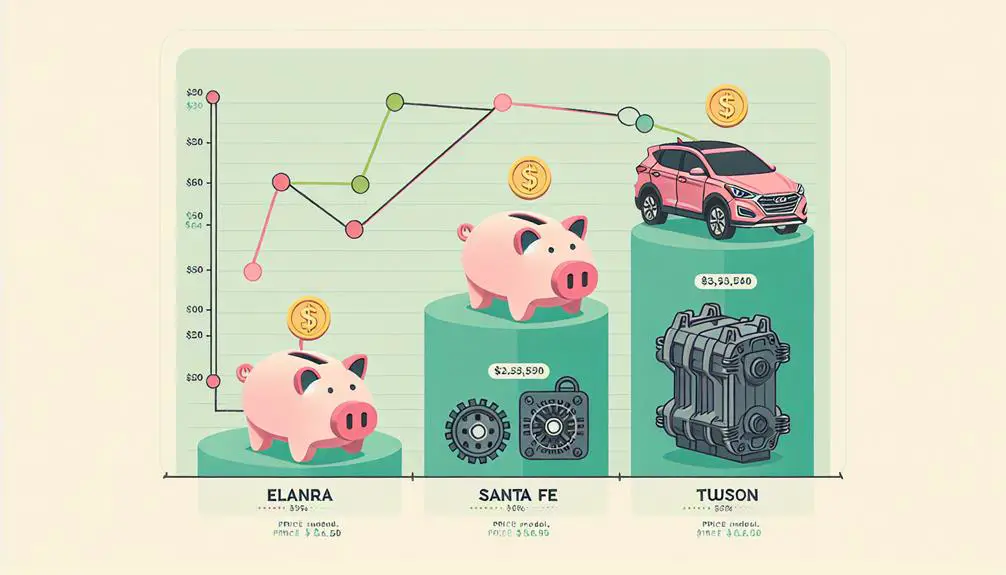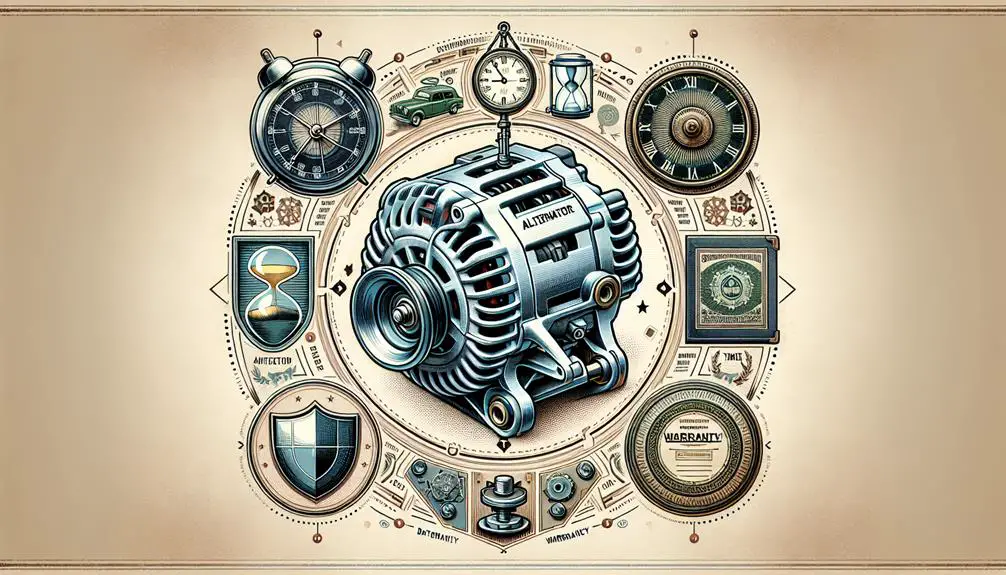The cost of a Hyundai alternator ranges widely, depending on the model, year, and choice between new or refurbished parts.
Additionally, opting for professional installation or a DIY approach affects the total cost.
Understanding Alternator Functionality

To understand the importance of a Hyundai's alternator, know that it powers the car's electrical system while the engine is on. It changes mechanical energy from the engine into electrical energy, charges the battery, and powers systems like headlights, radio, and air conditioning. Without a working alternator, the battery would quickly run out, and the car could stop working.
The car's battery starts the engine, but the alternator keeps it running by keeping the battery charged. It's like the heart of the car's electrical system, keeping everything running when the car is moving.
In a Hyundai, if the alternator fails, you might see dim lights, a weak battery, or the car might stop due to electrical failure. These signs mean the alternator isn't powering the electrical components properly.
Knowing how your Hyundai's alternator works helps spot issues early, preventing breakdowns and expensive repairs. A working alternator keeps your car reliable, ready for driving without problems.
Factors Affecting Cost
Understanding the important role of your Hyundai's alternator in keeping the car's electrical system running helps us look at what affects the cost of fixing or replacing it.
The model and year of your Hyundai are big factors in the cost. Newer or more luxurious models usually need more expensive alternators because of their advanced technology. If you have a high-end Hyundai, you might pay more.
The choice of alternator matters too. You can choose between OEM (Original Equipment Manufacturer) parts and aftermarket parts. OEM parts are specific to your car's brand and are usually more expensive but guarantee a good fit and performance. Aftermarket parts are cheaper, but you need to be careful to choose one that works with your car.
Deciding between a new alternator and a refurbished one also affects the price. New parts are more reliable and often come with a warranty, making them more expensive. Refurbished ones are cheaper, but mightn't be as reliable unless they come from a trusted supplier.
Labor costs are important too. How easy it's to install the alternator can change how much you pay for labor. Some cars make it easy to replace the alternator, which costs less in labor, while others might need more work, increasing the cost.
All these factors together determine the total cost of fixing or replacing your Hyundai's alternator, so it's important to consider them carefully.
Average Price Range

The cost to replace or fix a Hyundai alternator ranges from $300 to $600. This cost varies due to different Hyundai models, the type of alternator, and the service location. The lower price might only cover the part for some models, especially if it's a refurbished or aftermarket alternator. The higher price includes a premium, possibly OEM part, and labor for installation.
Key points to consider:
- Model Specificity: Some Hyundai models need more expensive alternators, like luxury or high-performance cars.
- Part Quality: OEM parts cost more than aftermarket parts but might fit better and come with a warranty.
- Labor Costs: What you pay for labor can change a lot depending on where you're and who does the work. Dealerships usually charge more than independent shops.
- Additional Repairs: If other parts besides the alternator need work, it will increase the total cost.
DIY Vs. Professional Installation
When choosing between DIY and professional installation for a Hyundai alternator, think about how complex the task is and the money you might save. If you know a lot about cars and have the tools, doing it yourself could save money. But, if you're not confident or don't have the tools, it's better and might save money in the long run to pay a professional.
Here's a simple comparison:
| Aspect | DIY | Professional Installation |
|---|---|---|
| Cost | Only parts | Parts and labor |
| Time | It depends | Usually quicker |
| Tools Needed | Yes | No |
| Skill Level | Medium to high | Not applicable |
| Risks | Higher | Lower |
DIY means you need to know about your car's electrical systems and be confident in your skills. You'll have to spend time learning how to replace the alternator if you don't already know. Mistakes could cause more damage and costs.
Professional installation means you don't have to worry and you know the job will be done right the first time. Mechanics have the tools and skills to replace your alternator quickly and without the risks of doing it yourself. It might cost more at first, but when you think about the risks and your time, it could be the smarter choice.
Warranty and Longevity Considerations

When choosing between DIY or professional installation for your Hyundai's alternator, consider how it affects the warranty and how long the part lasts. Here's why professional installation might be better:
- Warranty Coverage: Alternators usually have warranties. Professional installation makes sure the warranty is valid, which can save you from future problems.
- Installation Quality: Professionals know how to install the alternator right, lowering the chance of damage. Bad installation can cause the warranty to be void and the part to wear out faster.
- Longevity: Alternators installed by experts last longer. They can also fix other issues that might affect the alternator.
- Peace of Mind: Knowing a professional has installed your alternator and it's under warranty can make you feel more secure. If something goes wrong, you know who to ask for help, saving you trouble and money.
Conclusion
Knowing how the part of the car that charges the battery works and what changes its price is important. Usually, you might pay between $200 and $600 for this part for a Hyundai car, but the price can change. Choosing to fix it yourself or having someone else do it can make the price different.
Remember to think about the guarantee and how long it lasts; these can help you save money later. Buying a good quality part now can help you avoid problems and extra costs later on.